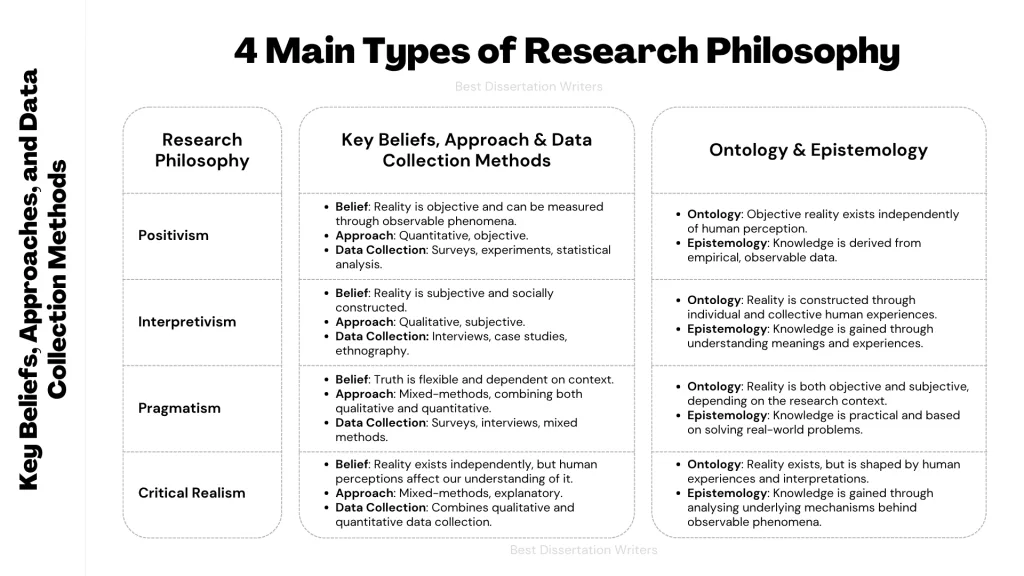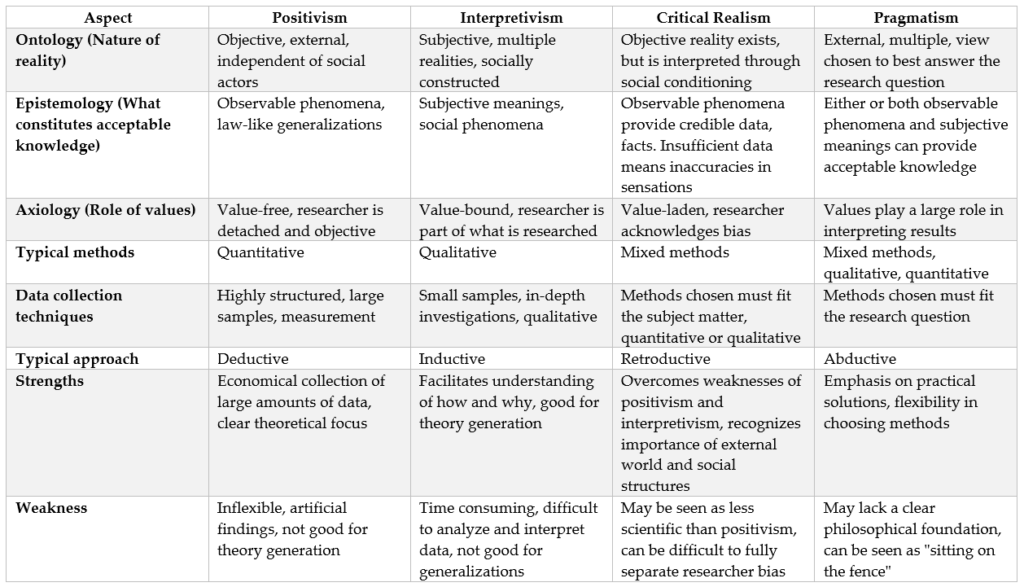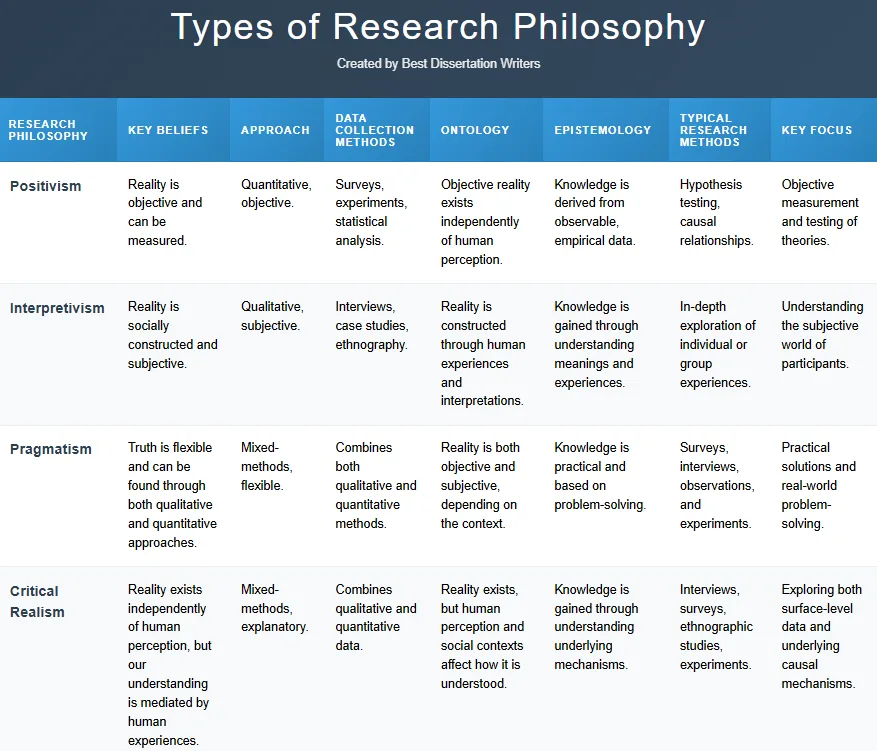Understanding the Concept of Research Philosophy in Methodology Chapter
What is Research Philosophy?
- Research philosophy refers to the underlying beliefs and assumptions about the nature of knowledge, reality, and research processes that guide the researcher throughout their study.
- It shapes the research methodology by dictating the choice between qualitative or quantitative research methods and the type of data collection methods used.
- The research philosophy influences the researcher’s approach to their dissertation, impacting the research design, methodology, and strategy used throughout the research project.
- It addresses important philosophical concerns such as ontology (the nature of reality) and epistemology (the nature of knowledge).
- Research philosophy is essential for identifying the researcher’s assumptions and beliefs about how knowledge is created, validated, and interpreted.
Is Research Philosophy the Same as Research Design?
- No, research philosophy is not the same as research design, although both are interrelated.
- Research design is the structure of the study, detailing how the research will be conducted, whereas research philosophy deals with the assumptions about the nature of knowledge and the researcher’s perspective on reality.
- The research philosophy will influence the research methods adopted and the way data is collected and interpreted.
- For example, a positivist philosophy often aligns with quantitative research methods, while an interpretivist philosophy typically uses qualitative methods to explore subjective experiences and interpretation.
EXPLORE RESEARCH PHILOSOPHIES – Click to Read!
* Learn the basics of positivism philosophy.
* Explore interpretivism as a research paradigm.
* Examine pragmatism philosophy in research.
* Uncover the framework of critical realism.
What Is a Research Philosophy Statement Example?
- A research philosophy statement articulates the researcher’s fundamental beliefs about knowledge, truth, and reality.
- For example, an interpretivist statement might claim, “This research adopts an interpretivist philosophy, believing that reality is socially constructed and that knowledge is subjective, shaped by individual experiences and perceptions.”
- The research philosophy chosen influences the research methodology, guiding the researcher’s decisions regarding the methodology chapter, data collection, and analysis.
- The statement clarifies the researcher’s perspective on ontology and epistemology, and informs the research strategy and the research question that the study seeks to answer.
The research philosophy defines the core approach to data collection, whether through methods such as interviews, surveys, or experiments, and ultimately shapes the outcome of the study. It reflects the philosophical assumptions and beliefs that will underpin the researcher’s entire research project.

What are the 4 types of research philosophy?
In the field of research, including disciplines such as science and humanities, research philosophy also plays a pivotal role in guiding the research design and methodology. It dictates how a researcher will approach their dissertation, the types of data collection methods they will use, and the overall research strategy.
There are four main types of research philosophies that influence how research is conducted: positivism, interpretivism, pragmatism, and critical realism. These philosophies are closely tied to the research process, ontology, and epistemology, impacting the way researchers perceive and interpret reality and knowledge. Let’s explore each of these in greater detail:
Professional Dissertation Writing Services
Get expert help with your dissertation from Best Dissertation Writers. Our experienced team ensures high-quality, custom-written dissertations that meet your academic requirements. Start today for top-notch results and timely delivery!
Positivism Philosophy for Quantitative Research Methods
- Definition: Positivism is a research philosophy that asserts that reality is objective and can be measured using quantitative methods. It is rooted in scientific traditions and relies heavily on empirical data.
- Key Beliefs: The positivist believes that knowledge is derived from observable and measurable phenomena. The researcher remains an observer, maintaining objectivity throughout the research project.
- Data Collection: Quantitative research methods such as surveys, experiments, and statistical analysis are often employed. The aim is to collect measurable data that can be analysed using statistical techniques.
- Methodology: A positivist approach favours objective reality, where facts are seen as independent of the researcher’s subjective interpretation. The research question is typically framed in a way that seeks to test hypotheses or theories.
- Philosophical Assumptions: Positivism assumes that the world operates according to fixed laws, which can be observed, measured, and analysed. It is closely linked to the idea that knowledge is external and not influenced by human perception.
Interpretivism Philosophy for Qualitative Research Methods
- Definition: Interpretivism is a research philosophy that stresses the importance of understanding subjective experiences and meanings that individuals attach to the world around them.
- Key Beliefs: The interpretivist approach holds that reality is socially constructed and can vary based on individuals’ beliefs and perceptions. The researcher actively engages with participants to understand their experiences and interpretations.
- Data Collection: This philosophy typically uses qualitative research methods such as interviews, focus groups, and case studies to gather in-depth insights into participants’ subjective experiences.
- Methodology: The research methodology for interpretivism involves a flexible approach that allows the researcher to explore the complexities of human behaviour. It involves interpreting the data to derive meaning and insight rather than simply measuring it.
- Philosophical Assumptions: Interpretivism assumes that knowledge is subjective and influenced by context. The researcher’s subjective interpretation plays a crucial role in analysing the data and generating findings.
Pragmatism Philosophy for Mixed-Methods Research
- Definition: Pragmatism is a research philosophy that advocates for a practical, flexible approach, combining both qualitative and quantitative research methods to answer the research question.
- Key Beliefs: Pragmatists believe that research philosophies should be adapted based on the problem at hand. The focus is on solving problems in the real world, where a holistic approach that incorporates both numerical data and human experience is most effective.
- Data Collection: In pragmatic research, data collection methods from both quantitative and qualitative approaches are employed. This may include surveys, interviews, and observations.
- Methodology: Pragmatism allows for flexibility in research methodology, adopting whatever methods are best suited to the research question. It also prioritises practical solutions and actionable findings over abstract theory.
- Philosophical Assumptions: Pragmatists argue that the research process should focus on the outcome of the research. They believe that knowledge is not fixed but evolves based on the practical implications of the research findings.
Critical Realism Philosophy for Mixed-Methods Research
- Definition: Critical realism is a research philosophy that combines elements of both positivism and interpretivism. It asserts that while reality exists independently of our perceptions, our understanding of reality is always mediated by human experiences.
- Key Beliefs: Critical realism posits that reality has both empirical and transcendental dimensions. The researcher seeks to uncover the underlying mechanisms that produce observable phenomena, recognising that subjective experiences can influence data interpretation.
- Data Collection: Critical realism typically employs mixed-methods research, integrating both quantitative and qualitative research techniques. This allows the researcher to explore both the measurable aspects of the research and the subjective meanings attached to it.
- Methodology: The research methodology in critical realism involves a layered analysis of both surface-level data and deeper, causal mechanisms. The aim is to provide a more comprehensive understanding of the research question.
- Philosophical Assumptions: Critical realism assumes that reality is structured and independent of human thought, but knowledge of this reality is always limited and mediated by perceptions, beliefs, and socially constructed frameworks.
Each research philosophy provides a unique lens through which to conduct a research project, impacting the research design, methodology, and data collection techniques used. Understanding these philosophies helps the researcher adopt the most appropriate approach for their dissertation and align their research with the philosophical assumptions that best suit their research objectives.

How to Choose the Right Research Philosophy for Your Dissertation?
- Understand your research question: The research philosophy you choose should align with the nature of your research question. Hence it has a direct influence on how the targeted data should be collected, analysed and used. If your research question aims to test theories or explore measurable data, a positivist philosophy might be suitable. For exploring subjective experiences, interpretivism could be the right fit.
- Consider your research objectives: The research philosophy should reflect your research objectives. If your aim is to uncover causal relationships, positivism may be the most appropriate, while if you seek to understand the essence of human experiences, interpretivism or pragmatism might be better.
- Reflect on the stage of your research: At different stages of the research, your research philosophy might evolve. For example, the early phase may involve exploratory qualitative data collection, reflecting an interpretivist approach, while later stages could adopt positivist techniques to test findings.
How to Ensure Strong Relationship Between Research Philosophy, Objectives, and Questions
- Consistency is key: The research philosophy must directly influence your research objectives and questions, significance of the study. Ensure that your methodology, research design, and data collection methods are consistent with the philosophical assumptions of your chosen research philosophy.
- Clarify your assumptions: Clearly outline your assumptions about the nature of reality and knowledge. Whether you believe reality is subjective or constructed will determine your research philosophy and the approaches you adopt.
- Consult your supervisor: Your supervisor can provide valuable insight into the alignment of your research philosophy with your objectives and questions. They can help ensure that your research design remains coherent with the chosen philosophy.
Tips for Aligning Research Design with Research Philosophy
- Choose appropriate data collection methods: Your research philosophy should guide the methods you use for data collection in order to successfully achieve primary purpose of your study. For example, if you adopt a positivist philosophy, you will likely favour quantitative data collection methods such as surveys or experiments.
- Ensure the methodology fits your philosophy: The methodology chapter should clearly reflect your research philosophy. If you select a pragmatic approach, a combination of both qualitative and quantitative methods may be appropriate.
- Stay true to your research philosophy: Throughout your research, ensure that your choices—whether in data collection or analysis—are consistent with your philosophical assumptions. This will strengthen the integrity and coherence of your research.
Understanding The Main Research Paradigms
- Positivism: Believes in objective reality and uses quantitative methods to gather measurable data.
- Interpretivism: Views reality as subjective and shaped by personal experiences, using qualitative research methods to explore these experiences.
- Pragmatism: Combines both quantitative and qualitative research methods, focusing on practical implications and problem-solving.
- Critical Realism: A hybrid of positivism and interpretivism, recognising an objective reality while acknowledging that human perception shapes our understanding of it.
Choosing the right research philosophy is a fundamental decision that will affect your entire research project. Be sure to carefully consider the nature of your research question, objectives, and design to ensure they align with your chosen philosophy.

What is the Role of Epistemology and Ontology in Research Design?
- Epistemology and ontology are critical components of research philosophy that shape how a researcher approaches their dissertation. These philosophical concepts influence the methodology, research questions, and data collection methods.
Defining Epistemology in the Context of Research
- Epistemology refers to the study of the nature of knowledge—how we know what we know and the beliefs that guide our understanding of reality.
- It influences research philosophy by determining how knowledge is acquired. For example, in a positivist research philosophy, epistemology assumes that knowledge is objective and measurable through quantitative methods.
- Epistemology also influences the type of data collection methods that are considered valid. In qualitative research, it might prioritise subjective experiences, while quantitative research focuses on objective facts.
EXPLORE RESEARCH PHILOSOPHIES – Click to Read!
* Learn the basics of positivism philosophy.
* Explore interpretivism as a research paradigm.
* Examine pragmatism philosophy in research.
* Uncover the framework of critical realism.
Ontology and Its Relevance to Research Methodology
- Ontology deals with the nature of reality itself—what exists and how it is perceived. It questions whether reality is objective or subjective.
- In research philosophy, ontology underpins the assumptions about what is real. For example, a positivist researcher assumes an objective reality, while an interpretivist might believe that reality is constructed through social and cultural contexts.
- The ontological stance will directly influence the choice of specific research methodology—whether the researcher adopts quantitative or qualitative methods, or perhaps a mix of both.
How Epistemology and Ontology Influence Research Questions
- Epistemology shapes how research questions are framed. For example, positivist research questions often aim to test hypotheses, while interpretivist research questions explore subjective meanings.
- Ontology also influences research questions by defining what can be studied. If reality is considered objective, research questions may seek measurable phenomena. If reality is viewed as subjective, the questions may focus on understanding human experiences and interpretations.
- The relationship between epistemology, ontology, and research philosophy ensures that the research design aligns with the researcher’s worldview, guiding the entire process of data collection and analysis.
Epistemology and ontology are foundational to shaping the research philosophy. They influence everything from research questions to data collection methods, ensuring that the research methodology is coherent with the philosophical assumptions about reality and knowledge.
